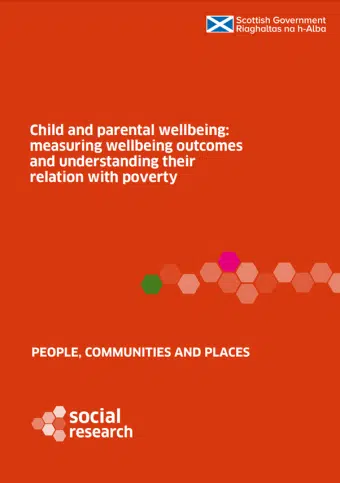8th March 2024
This week, the Scottish Government has published its latest report “Child and parental wellbeing: measuring outcomes and understanding their relation with poverty”. Tackling child poverty and achieving the targets set by the Child Poverty (Scotland) Act 2017 is a key imperative of the Scottish Government’s plans to improving the lives of Scotland’s children, young people and families.
The report contains important findings and learning on tackling inequalities and improving parents’ and children’s wellbeing, quality of life and life chances which will be of interest to health visiting practitioners working in all UK nations. Drawing on the evidence, the report’s authors recognise that child poverty targets are not an end in themselves. However, poor life outcomes for children and parents are driven by poverty. To address this, the Scottish government has set out a range of actions to reduce child poverty and enhance wellbeing of children and families.
This report intends to be a first step in assessing wellbeing outcomes and understanding their relation with poverty for low income families. The authors present the findings as “experimental” and hope that it will be seen as “a discussion starter in order to facilitate and develop our understanding of wellbeing and poverty. It provides us with a starting point of what we know, what we do not know, and what we need to know.
The ultimate aim is to monitor whether action across drivers of poverty is associated with successful and sustainable ways of improving life chances for families living in poverty, and importantly that it does no additional harm.”
The findings highlight that, in Scotland:
- The ongoing cost-of-living crisis is impacting upon the mental health of both parents and children. For many households, the cost-of-living crisis has resulted in a lack of social connection, and increased isolation.
- Children living in areas of high deprivation continue to record greater developmental concerns in the early years, lower attainment while in school, were less likely to undertake physical activities in their early teenage years, and recorded greater difficulties with their mental health.
- On a positive note, over recent years, there is evidence of a reduction in the poverty-related gap across these measures in Scotland, particularly in terms of attainment. However, it should be noted that during the COVID-19 pandemic there was a clear widening of the poverty-related attainment gap, which has started to reduce again in Scotland in the years since.
The Children, Young People and Families Outcomes Framework, and the associated 21 core wellbeing indicators, permits for baseline findings to measure progress – with a particular focus on child wellbeing in relation to poverty. The indicators considered under parental wellbeing can also be used to measure progress, but also allow open a dialogue in order to better understand the connections between wellbeing and poverty for families living in poverty.
We know that whole family wellbeing is crucial to creating the conditions for families to be able to navigate their way out of poverty and to enable families to thrive. However, overall, there are lower levels of health and wellbeing amongst children, young people and families living in higher areas of deprivation.
The report reiterates the need for actions, such as those outlined in Scotland’s Best Start, Bright Futures, which seek to strengthen and enhance wellbeing for families living in poverty. By doing so, this can help to support children and young people to achieve their potential.



